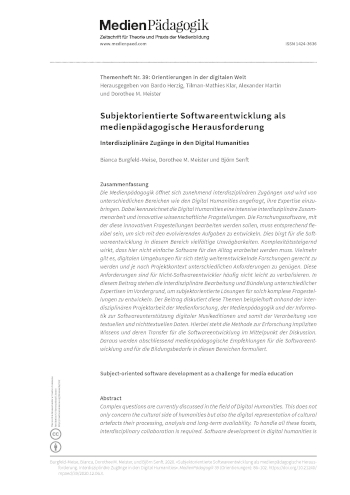Abstract
Complex questions are currently discussed in the field of Digital Humanities. This does not only concern the cultural side of humanities but also the digital representation of cultural artefacts their processing, analysis and long-term availability. To handle all these facets, interdisciplinary collaboration is required. Software development in digital humanities is one aspect within this discipline. Highly specialized software is developed for scientific research. This introduces an uncertain element when designing the software: the user group is characterised by expertise and their knowledge is therefore often implicit. Research with digital data in a digital environment being different from traditional research and its continual advancement increase the complexity even further. These issues have to be recognized by all participating research disciplines with DH context in order to make research contributions. The article discusses these topics using the interdisciplinary project work of media studies and computer science for software support of digital music editing and thus handling of textual and non-textual data. The method of researching the perspective and needs of the subjects and converting them to requirements are the focus of this discussion.
References
Aßmann, Sandra. 2013. Medienhandeln zwischen formalen und informellen Kontexten: Doing Connectivity. Medienbildung und Gesellschaft. Wiesbaden: Springer Fachmedien Wiesbaden. https://doi.org/10.1007/978-3-658-01940-2.
Bohnsack, Ralf. 2010. Rekonstruktive Sozialforschung: Einführung in qualitative Methoden. Opladen u.a.: Barbara Budrich.
Burdick, Anne, Johanna Drucker, Peter Lunenfeld, Todd Presner, und Jeffrey Schnapp. 2012. DIGITAL HUMANITIES. Cambridge, Massachusetts: MIT Press.
Constantine, Larry L. und Luca A. D. Lockwood. 1999. Software for Use: A Practical Guide to the Models and Methods of Usage-Centered Design. Boston, San Francisco, New York et al: Addison-Wesley Professional.
Cooper, Alan, Robert Reimann, und David Cronin. 2007. About Face 3: The Essentials of Interaction Design. Indianapolis: Wiley Publishing. https://fall14se.files.wordpress.com/2017/04/about_face_3__the_essentials_of_interaction_design.pdf.
Schallmo, Daniel R. A., und Klaus Lang. 2017. Design Thinking erfolgreich anwenden. Wiesbaden: Springer Gabler.
Feder, Georg. 1987. Musikphilologie: Eine Einführung in die musikalische Textkritik, Hermeneutik und Editionstechnik. Darmstadt: Wissenschaftliche Buchgesellschaft.
Méndez Fernández, Daniel, und Stefan Wagner. 2015. «Naming the Pain in Requirements Engineering: A Design for a Global Family of Surveys and First Results from Germany». Information and Software Technology 57 (Januar): 616–43. https://doi.org/10.1016/j.infsof.2014.05.008.
Flick, Uwe. 2002. Qualitative Sozialforschung. Eine Einführung. 6., überarb. und erw. Aufl. Reinbek bei Hamburg: Rowohlt.
Flick, Uwe, Ernst von Kardorff, und Ines Steinke, Hrsg. 2000. Qualitative Forschung. Ein Handbuch. Reinbek: Rowohlt.
Frohlich, David M., und Risto Sarvas. 2011. «HCI and Innovation». In Proceedings of the 2011 Annual Conference Extended Abstracts on Human Factors in Computing Systems - CHI EA ’11, 713. Vancouver, BC, Canada: ACM Press. https://doi.org/10.1145/1979742.1979670.
Gervasi, V., R. Gacitua, M. Rouncefield, P. Sawyer, L. Kof, L. Ma, P. Piwek, u. a. 2013. «Unpacking Tacit Knowledge for Requirements Engineering». In Managing Requirements Knowledge, hrsg. v. Walid Maalej und Anil Kumar Thurimella, 23–47. Berlin, Heidelberg: Springer. https://doi.org/10.1007/978-3-642-34419-0_2.
Hickey, Ann M., und Alan M. Davis. 2004. «A Unified Model of Requirements Elicitation». Journal of Management Information Systems 20 (4): 65–84. https://doi.org/10.1080/07421222.2004.11045786.
Holtzblatt, Karen, Jessamyn Burns Wendell, und Shelley Wood. 2004. Rapid Contextual Design. A How-to Guide to Key Techniques for User-Centered Design. San Francisco: Morgan Kaufman.
IDEO LLC. 2013. Design Thinking for Educators. https://designthinkingforeducators.com/toolkit/.
Kamin, Anna-Maria. 2017. «Lernen mit digitalen Medien – Rekonstruktion empirisch emergierter und abduktiv generierter berufsbiographischer Lernmuster». In Projekt – Theorie – Methode. Spektrum medienpädagogischer Forschung, hrsg. v. Thomas Knaus, 317–346, München: koepad.
Kelley, Tom. 2001. The Art of Innovation. Lessons in Creativity from IDEO, America’s Leading Design Firm. New York: Doubleday.
Keuneke, Susanne. 2005. «Qualitatives Interview». In Qualitative Medienforschung. Ein Handbuch, hrsg. v. Lothar Mikos und Claudia Wegener. 254–267, Konstanz: UVK.
Knaus, Thomas, Hrsg. 2017. Projekt – Theorie – Methode. Spektrum medienpädagogischer Forschung. München: koepad.
Maiden, Neil, Sara Jones, Kristine Karlsen, Roger Neill, Konstantinos Zachos, und Alastair Milne. 2010. «Requirements Engineering as Creative Problem Solving: A Research Agenda for Idea Finding». In 2010 18th IEEE International Requirements Engineering Conference, 57–66. Sydney, Australia: IEEE. https://doi.org/10.1109/RE.2010.16.
Mey, Günter, und Katja Mruck, Hrsg. 2011. Grounded Theory Reader. Wiesbaden: VS Verlag für Sozialwissenschaften. https://doi.org/10.1007/978-3-531-93318-4.
Meyer, Bertrand. 2014. Agile! The Good, the Hype and the Ugly. Cham: Springer International Publishing. https://doi.org/10.1007/978-3-319-05155-0.
Müller-Benedict, Volker. 2007. Grundkurs Statistik in den Sozialwissenschaften. Eine leicht verständliche, anwendungsorientierte Einführung in das sozialwissenschaftlich notwendige statistische Wissen. 4., Auflage. Wiesbaden: VS Verlag für Sozialwissenschaft/ GWV Fachverlage GmbH. https://doi.org/10.1007/978-3-531-90757-4.
Neuweg, Georg Hans. 1999. Könnerschaft und implizites Wissen, Zur lehr-lerntheoretischen Bedeutung der Erkenntnis- und Wissenstheorie Michael Polanyis. Münster: Waxmann.
Pohl, Klaus. 2007. Requirements Engineering. Heidelberg: dpunkt.
Polanyi, Michael. 1985. Implizites Wissen. Frankfurt: Suhrkamp.
Przyborski, Aglaja, und Monika Wohlrab-Sahr. 2009. Qualitative Sozialforschung. Ein Arbeitsbuch. München: Oldenbourg.
Reinmann, Gabi. 2005. «Innovation ohne Forschung? Ein Plädoyer für den Design-Based Research-Ansatz in der Lehr-Lernforschung». Unterrichtswissenschaft 33 (1): 52–69. http://nbn-resolving.de/urn:nbn:de:0111-opus-57878.
Riethmüller, Jürgen. 2012. Der graue Schwan: Prolegomena zum Wissen der Wissensgesellschaft. Paderborn u.a.: Fink.
Strauss, Anselm, und Juliet Corbin. 1996. Grounded Theory. Grundlagen qualitativer Sozialforschung. Weinheim: Beltz.
Sutcliffe, Alistair, und Pete Sawyer. 2013. «Requirements elicitation: Towards the unknown unknowns». In 2013 21st IEEE International Requirements Engineering Conference (RE), 92–104. Rio de Janeiro-RJ, Brazil: IEEE. https://doi.org/10.1109/RE.2013.6636709.
Venkatesh, Viswanath, und Hillol Bala. 2008. «Technology Acceptance Model 3 and a Research Agenda on Interventions». Decision Sciences 39 (2): 273–315. https://doi.org/10.1111/j.1540-5915.2008.00192.x.
Winter, Rainer. 2010. «Handlungsmächtigkeit und technologische Lebensformen: Cultural Studies, digitale Medien und die Demokratisierung der Lebensverhältnisse». In Mensch und Medien. Philosophische und sozialwissenschaftliche Perspektiven, herausgegeben von Manuela Pietraß und Rüdiger Funiok, 139–57. Wiesbaden: VS Verlag für Sozialwissenschaften. https://doi.org/10.1007/978-3-531-92244-7_7.
Wittgenstein, Ludwig. 1984. Über Gewißheit. Frankfurt am Main: Suhrkamp.
Zühlke, Detlef. 2012. Nutzergerechte Entwicklung von Mensch-Maschine-Systemen. Useware-Engineering für technische Systeme. VDI-Buch. Berlin, Heidelberg: Springer. https://doi.org/10.1007/978-3-642-22074-6_1.

